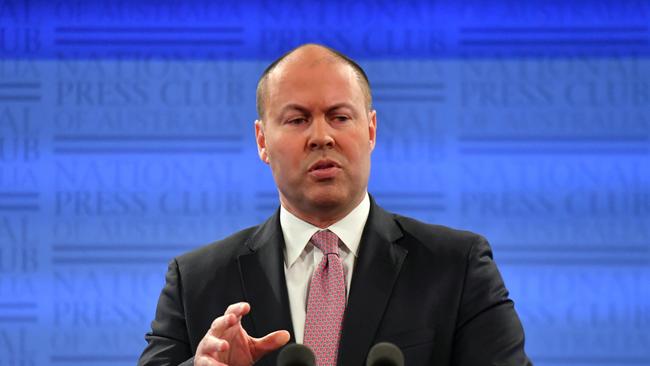Coronavirus: Fresh game plan to deploy the missing four million

On a positive note, we should cast our gaze to other countries, where the per capita COVID-19 death rate is 100 times greater in Britain, 50 times higher in the US. We’ve flattened the infection curve via travel bans, isolation, social distancing, testing and tracing; it has put the economy in suspended animation, eliciting a “whatever it takes” $214bn response with cash handouts, $1500-a-fortnight wage subsidies, increased welfare payments and free childcare. Liquidity measures worth $105bn are coming from the central bank and Canberra. A budget in balance has been shredded, with a plunge in revenue and a consequent rise in debt and interest costs. The Treasurer said we’d be living within our means for years, with the emergency fiscal measures temporary, targeted and proportionate. He said the debt burden would be reduced by a fast-growing economy, not higher taxes.
The recovery depends on a dynamic business sector. According to Deloitte Access Economics, a $69bn collapse in business investment this year threatens that revival. The Morrison government claims it is sifting through practical solutions, hoping to harvest a fresh growth, jobs and productivity agenda. Mr Frydenberg was recycling last year’s budget speech by emphasising skills, infrastructure, investment tax breaks and flattening the personal income tax scale. We said it then, we’ll say it now: Australia needs a bolder reform game plan, not one-off measures, bracket-creep kickbacks and a 10-year capital works program, as worthy as those measures may be. The Treasurer points out how the crisis has led to new modes at workplaces, reduced red tape and improved intergovernmental co-operation. Will we simply snap back to the old ways, when productivity was on the slide?
A pleasing sign is Mr Frydenberg remains attuned to the core values he trumpeted in his first budget last year, providing philosophical and rhetorical ballast to the revival project. He again accentuated encouraging personal responsibility, maximising personal choice, rewarding effort, risk taking and ensuring a safety net that is based on decency and fairness. While Scott Morrison took a limited number of policies to the people last May, they were grounded in aspiration, thrift, mutual obligation and openness to the world. Bill Shorten offered revolution, redistribution and retribution in the minds of get-ahead Australians. Labor ditched its legacies of removing growth impediments, using market solutions and encouraging aspiration, for class war and niche social engineering. How far forward has it moved under its new leadership? It has regressed into Bambi-eyed Hansonism on foreign workers.
With weaker demand locally and globally, the Treasurer said there would be more competition in the post-virus world for all goods and services. We need workplace reforms and tax policy fit for the challenge. Right now, large employers pay a 30 per cent company tax, the second highest rate among rich countries. Mr Frydenberg maintains unleashing the power of dynamic, innovative and open markets is central to recovery, with the private sector leading job creation, not government. So why are our big companies carrying huge weight on a sodden racetrack? As well, there is far too much complexity and not enough flexibility in industrial relations. Redeploying the missing four million workers will be more difficult because of our antiquated work rules.
Like the Treasurer, we see a clear and present danger of protectionist sentiment re-emerging on the other side of the crisis. There is a new push to make manufacturing great again. Why not? It makes sense to boost capacity to produce personal protective equipment here rather than rely on billionaire middlemen to source supplies from China. But factories need to survive on their own wits, not behind a fortress wall. Subsidies suck scarce capital and labour that could be put to better use. By all means we should reduce the impediments to local manufacturing through supply-side reforms, and improve the incentives for product research and development. “While we must always safeguard our national interest, we must also recognise the great benefits that have accrued to Australia as a trading nation,” the Treasurer said. We ship a tremendous amount of ore overseas, produce three times as much food as we can eat and have a unique continent many people would like to visit. Those competitive advantages have made us prosperous. Let’s not squander our future options with a timid or retrograde strategy.


Josh Frydenberg shared a snapshot of Australia in grim pandemic shutdown on Tuesday. In essence, four million median-income workers are missing in action, a loss of $4bn a week because of reduced participation, productivity and consumption. The Treasurer told the National Press Club things would get worse before they got better. In the June quarter, gross domestic product will contract by 10 per cent, with our economy $50bn smaller. More than one million jobs have disappeared, wage bills have been slashed, spending on hospitality and recreation have been cut in half. As Mr Frydenberg noted, the jobless rate will climb quickly to 10 per cent or more, using the up escalator; the eventual recovery will be much slower, with unemployment taking the stairs down.